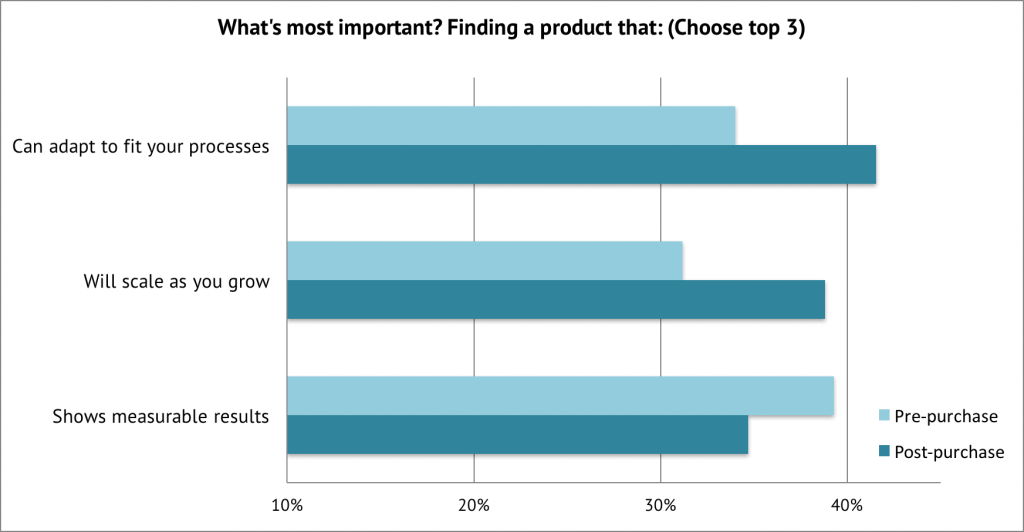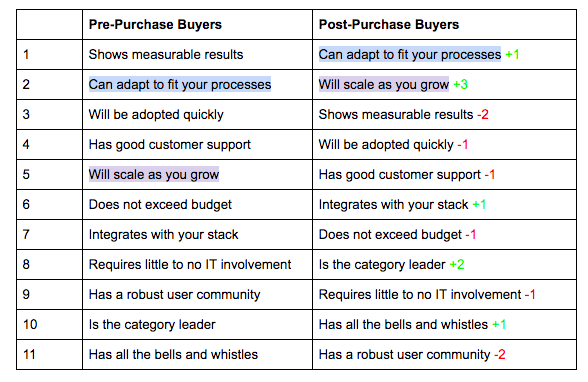Don’t Forget These Two Things: Buyers Recall Different Priorities Before & After Purchasing
Generally, no product wins on all dimensions. When you’re shopping for business software, you’re probably weighing reality against a set of ideal criteria, and preparing to make a few trade-offs. You might not get all the bells and whistles if you have a tight budget, for example. Or the product that’s easiest to use may not have all the features you want.
But what’s important to you before you make a purchase may not align exactly with your future self—the one that has to deal with making the product work for your organization.
We recently asked buyers at two different stages what is (or was) most important to them. The results reveal subtly different priorities that are important to bear in mind as you make your selection decision. Learning from other buyers’ and reviewers’ experiences could help you feel more confident in your decision and know what to expect from your purchase.
First we asked buyers who hadn’t yet made a purchase to tell us which three criteria (from a list of 11) were most important to them. The top three answers were finding a product that shows measurable results (chosen by 39% of buyers), can adapt to fit your processes (34%), and will be adopted quickly (33%). The three least popular answers were finding a product that has all the bells and whistles (5%), is the category leader (11%), and has a robust user community (12%).
But when we asked buyers who had already made a purchase about what drove their decisions, there were two notable changes: adaptability and scalability moved to the top of the list.

In fact, 42% of post-purchase buyers ranked adaptability as one of their top three criteria (compared to 34% of pre-purchase buyers). Similarly, 39% of post-purchase buyers said they wanted to find a product that would scale as they grew (compared to 31% of pre-purchase buyers). Finding a product that shows measurable results dropped down to the third most important factor for post-purchase buyers.

This isn’t too surprising. When you’re looking to make an investment, the first thing on your mind is ensuring that there’s going to be a return on that investment. Adaptability and even more so scalability come more into play once you’ve got a product in place. They’re often top of mind when users are writing reviews and offering advice to other buyers.
For example, this Asana reviewer praises the tool’s ease of use, but also says the product didn’t work in a larger, agency context: “When I carried it over to my full-time job at a digital marketing agency, it didn’t scale as well to the needs of a similarly-sized team that was running many concurrent projects (about 20 across the account) at once, each containing multiple steps of concepting and internal/client review. Overall this is still a great tool for relatively small- to medium-sized, fast-paced collaborative projects.”
This HubSpot CRM reviewer lists scalability as one of the key questions to ask when selecting a CRM, along with how well it integrates with your stack and whether it offers sufficient training: “Does the CRM software help sales find more info about prospects and customers? Can the CRM software easily be scaled to meet growing demands for B2B markets?”
Finally, this reviewer says AWS is the right choice if you’re thinking about scale, given the product’s performance and reliability: “AWS has a well known reputation for being reliable for a number of different services. As your company scales, it is known to be the go to in order to provide the reliability needed to grow as a business.”
How to Determine Adaptability and Scalability
While flexibility and scalability might not drive your final selection decision, it will certainly be useful to know whether they are trade-offs you’re having to make–and if they are, how you’ll handle process changes, customization, performance and reliability, etc. when the time comes So these are two factors worth bringing into your initial research and planning.
But determining beforehand whether a product can adapt to fit your processes, or will scale as you grow, may not be very easy or straightforward. Here are some approaches to try, based on feedback from veteran buyers.
Ask the Vendor for a Custom Demo or a Trial
Many buyers will include a specific scenario in an RFP, or outline a scenario for a custom demo. Giving the vendor an example of your process and letting them react will help you gauge whether the product is flexible enough to fit your processes.
Even better is trying the product out, bringing in your own actual data (or similar, dummy data in a sandbox environment). This can be time-consuming, but well worth it to avoid post-purchase surprises.
Talk to Customers that Fit Your Use Case and Scale Requirements
Another great way to test out scalability is to talk to current customers. Ask the vendor for examples of customers that scaled as you plan to, or customers that best fit your use case for the product.
Ask those references targeted questions about their experience with the product as their organization or usage grew. What challenges did they face? How did their usage of the product change? What would they do differently if they went through it all again?
Search for Clues in Reviews on TrustRadius
Reviews are a great way to understand the end-user experience, especially around factors like ease of use, and which features work well or which could stand to improve. But you can also use reviews to suss out adaptability and scalability.
If you visit the product page on TrustRadius, you can search for terms like “scale” or “scalable” to find reviews that mention the topic specifically. You can also filter reviews for answers to specific questions like the use case and deployment scope question, which may be a good way to find reviews that best fit your own use case. Finally, filter by company size to find reviewers at companies of either your size today, or where you plan to be in a year or two to understand how well the product works for them.
Was this helpful?
